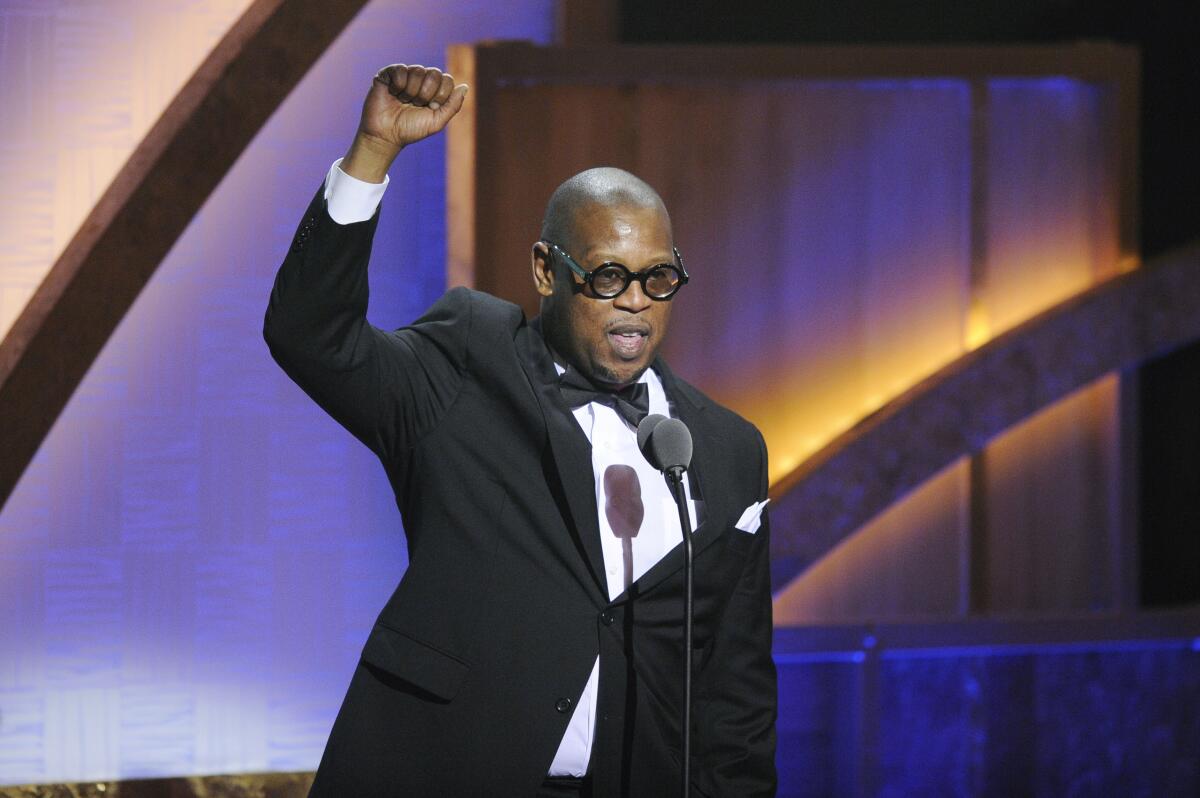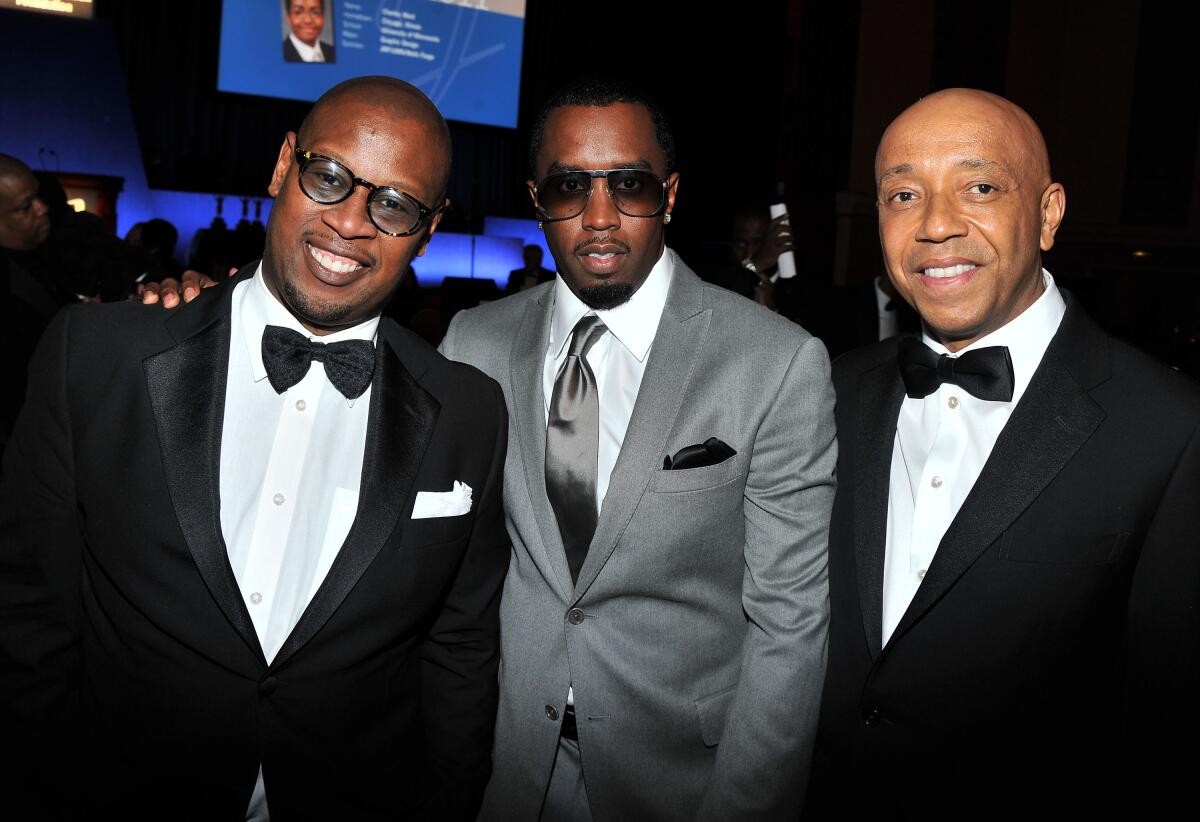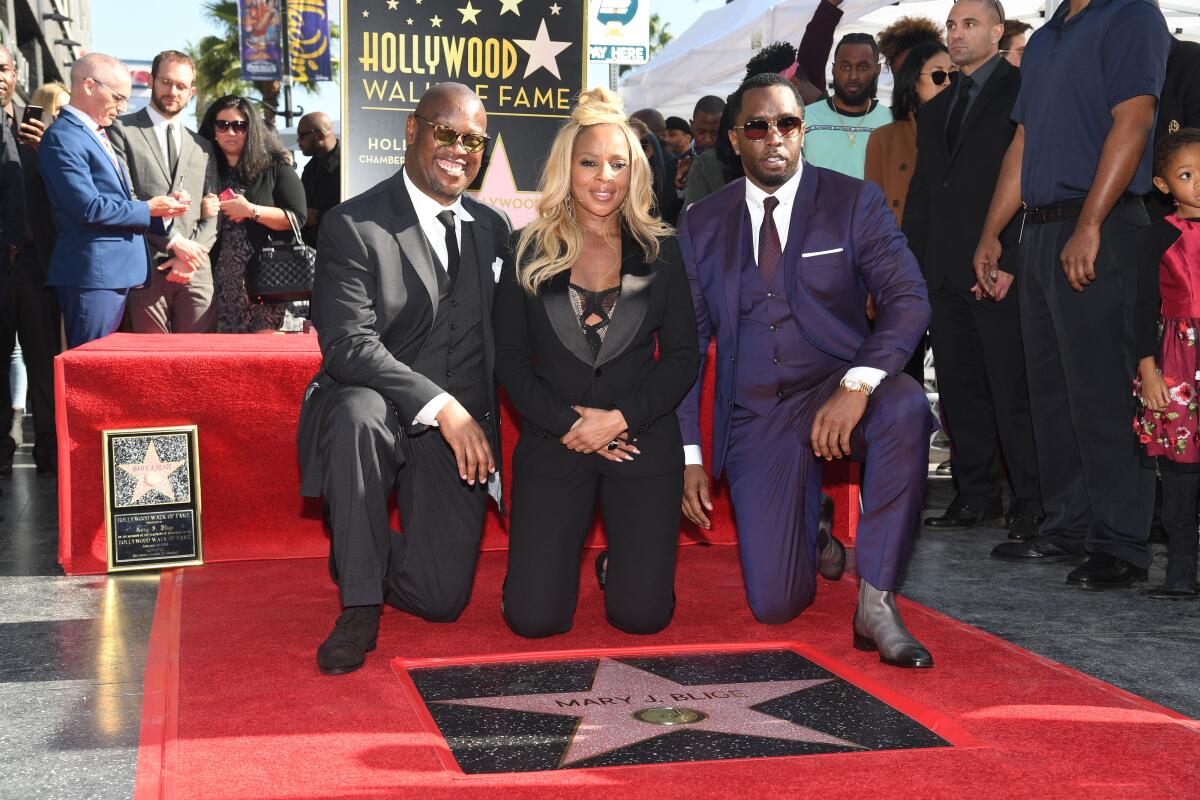Andre Harrell’s radical, genius idea: Hip-hop and R&B belonged together

The look was thoroughly modern: two handsome young men, one shirtless under a backward baseball cap, the other wearing a green leather vest and shades. Yet when K-Ci and JoJo Hailey opened their mouths to sing, the sound from the brothers was as classic as could be.
Performing on a 1993 episode of MTV’s “Unplugged,” the members of the R&B quartet Jodeci brought a churchy vocal finesse to Stevie Wonder’s ballad “Lately” that could’ve moved anyone uncharmed by their rugged outfits.

And they weren’t the only ones blending old and new that night. Elsewhere in the show featuring acts from the Uptown Records label — whose influential founder, Andre Harrell, died Thursday from heart failure at age 59 — Mary J. Blige took the stage in a track suit and doorknocker earrings to give Chaka Khan’s “Sweet Thing” a dash of her signature grit.
“I think you are the one for me,” she sang, her head nodding to a crisp boom-bap beat, “Here is where you want to be.”
Little Richard, who died on Saturday at 87, whipped audiences into frenzies from the earliest days of rock ’n’ roll.
Today, in the age of the infinite stream, we take for granted the close relationship between hip-hop and R&B — and also that pioneering artists are able to find the audience they deserve. But three decades ago those worlds needed bridging, by an executive with the vision to make hits and the clout to get them heard.
Harrell, as that acclaimed “Uptown Unplugged” special made clear, was that executive.
By the time it aired, Harrell — remembered Saturday as a “consummate music man” by industry veteran Irving Azoff, who led MCA Records when the major label partnered with Uptown in 1988 — had already made stars of Blige, Jodeci, Guy, Al B. Sure! and Heavy D & the Boyz and had set Sean “Diddy” Combs, a one-time Uptown intern, on a path toward moguldom himself.

This was the hip-hop soul era, when balladeers wore hoodies and chunky boots and relocated their tales of seduction from the boudoir to the street. “I’m searching for a real love,” Blige sang over a looped piano lick and club-ready bass in her breakout single, “Real Love,” and the frayed edges of her voice told you all about the honesty she had in mind. (A popular remix of the song added a verse by the Notorious B.I.G. and a prominent sample from “Clean Up Woman” by Betty Wright, who died Sunday.)
Jodeci’s slow jams put across a similar attitude — brash but tender — with sumptuous harmonies amid densely programmed beats. “So you’re having my baby,” K-Ci sang to open the title track of the group’s triple-platinum debut, “Forever My Lady” — another striking indication of Uptown’s commitment to a fresh brand of emotional realism.
“It was so strange — and refreshing — to hear K-Ci sing those kind of lyrics,” said Danyel Smith, former editor in chief of Vibe and Billboard magazines. “And Mary too on ‘My Life,’” Smith continued, referring to Blige’s 1994 album. “There had been spaces where black women had been frank in pop and R&B, but not from someone so stylish or relevant to a young audience — or someone so unapologetic about who she was.”
Before he made his label a home for hip-hop soul, Harrell helped introduce the slick but highly percussive sound known as new jack swing with Uptown’s release of the self-titled 1988 debut by Guy. To listen now to the album’s proudly mechanized rhythms (as masterminded by the trio’s Teddy Riley) is to hear a crucial step in the evolution of R&B’s textural palette.
“Such a short time to paradigm shift music TWICE,” Questlove of the Roots wrote in an admiring Instagram post about Harrell, who he said “gave you the best soundtracks of your life.”

Born in New York, Harrell came up through the city’s hip-hop scene as a rapper in an early-’80s duo, Dr. Jeckyll & Mr. Hyde; its sole album, with a cover photo showing Harrell and his partner Alonzo Brown wearing the kind of tailored suit that Harrell would be seen in throughout his life, was titled “The Champagne of Rap.”
Harrell went on to work for Russell Simmons at Simmons’ management company and at Def Jam, the groundbreaking rap label, before starting Uptown in 1986. Where Simmons was drawn to the “extremes on the inner-city tip,” as Harrell told Vanity Fair in 1993, Uptown’s founder sought to showcase music that balanced rough and smooth and could appeal to listeners of different ages and backgrounds.
“He would let an artist be young culturally — the way they dressed, the way they talked, the swag,” said Mark Siegel, a longtime talent agent who booked Dr. Jeckyll & Mr. Hyde and later served as general manager at Uptown. Now head of music at ICM Partners, Siegel added: “But Andre loved old R&B: the O’Jays, the Gap Band. The music at Uptown transcended generations.”
Propelled by the success of chart-topping hits from the friendly Heavy D and the breathy-voiced Al B. Sure!, Harrell quickly joined the elite ranks of African-American record executives — his contemporaries included L.A. Reid and Kenny “Babyface” Edmonds — then taking the baton from trailblazers like Motown’s Berry Gordy Jr.
“My goal is to bring black America — just as it is, not watered down — to people everywhere through music, through films, through everything we do,” he told The Times in 1992 after re-upping with MCA in a $50-million deal that established a new multimedia company, Uptown Entertainment.
The next year he famously fired Combs, who’d taken on a high-profile creative role with Blige and Jodeci and who’d begun to chafe under Harrell’s authority. Yet when Combs started his own label, Bad Boy Records — and took with him the Notorious B.I.G., who’d released his first solo single as part of Uptown’s soundtrack for 1993’s “Who’s the Man?” — it was Harrell, insiders say, who persuaded Arista’s Clive Davis to fund Bad Boy in a joint venture that became a hip-hop supernova.
For “finding and developing” Combs, Davis told The Times on Sunday, “I will personally always be grateful” to Harrell.

Many who knew him said that Harrell’s greatest talent was identifying skills that those around him didn’t know they had. As an example, Siegel pointed to Heavy D. “Andre convinced him he was sexy and that he should dance,” Siegel said. “Heavy D was like, ‘I don’t wanna dance — I’m too big.’ But Andre told him he should, and that’s what blew him up. He saw it.”
Later in the ’90s, Harrell briefly led Motown; more recently he rejoined his old protege as an executive at Combs’ Revolt TV. Last year BET announced it was creating a miniseries about Uptown, and Saturday the network said it planned to move ahead with the miniseries when film and TV production resume amid the COVID-19 pandemic.
But one of his final creative acts was more modest, and that was helping to persuade a reluctant Babyface to go up against Riley in a blockbuster Instagram Live battle that attracted approximately half a million viewers last month.
“ ‘Don’t think of it as a battle — think of it as a celebration,’” Babyface said Harrell told him. As usual, Harrell was finding a way to make a connection he knew needed to be made.
More to Read
The biggest entertainment stories
Get our big stories about Hollywood, film, television, music, arts, culture and more right in your inbox as soon as they publish.
You may occasionally receive promotional content from the Los Angeles Times.











